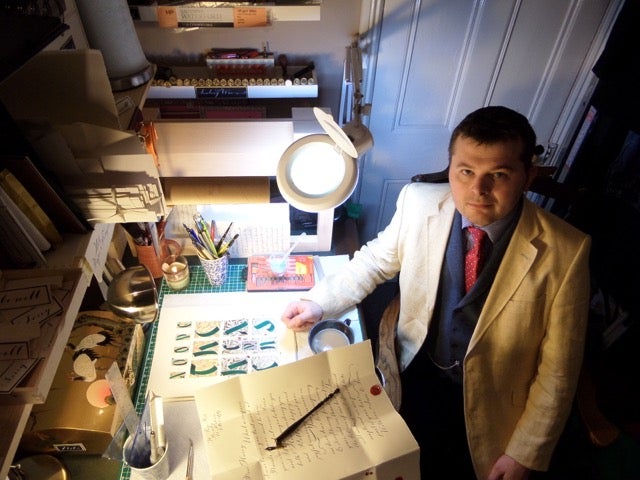
For those looking for something extra special this Valentine’s Day, butler-turned-calligrapher Stephen Duckett has the answer, writes William Cash
For anybody worried about what Valentine’s present to get the HNW in their lives who already has everything, how about a hand-delivered calligraphy love letter in authentic Regency-style script, in ‘iron gall ink’ using a 19th century recipe?
Oh, and each letter is folded and then sealed with your loved one’s initials and, if requested, hand-delivered to their front-door (or Mayfair office) by a butler who used to work for some of Britain’s greatest stately homes. Prices are around £275 per bespoke letter. He says he doesn’t ‘meddle’ with the content however tempting it might sometimes be.
Welcome to the very Gosford Park world of 37-year-old butler-turned-calligrapher Stephen Duckett, who – after training and serving as a butler in such great houses as Blenheim Palace, Hatfield House and Arundel Castle – now specialises in the production of one-off, epistolatory commissions for HNWs, from Valentine’s Day cards to handwritten and hand-sealed letters of marriage proposal on special paper.
At Blenheim Palace, Duckett worked as unofficial house calligrapher responsible for writing entries (eg Lord Blandford’s Shoot Party) in the palace’s visitor book. But he didn’t get a chance to show off his monk-like calligraphy skills on the placement and menu cards as these were typed up by a private secretary using an old-fashioned ribbon typewriter.
Duckett’s bespoke calligraphy business is a perfect example of a new trend in the HNW luxury sector: hand-crafted products which have rarity value: the sort of letters that he scripts look like they belong in the archive room of the Bodleian library. You are going to put them in your safe – not screw them up and toss them in the kitchen bin.
The mill from which his ‘hot-press paper’ comes has been producing since the 1700s. ‘Standards in handwriting have been slipping for years,’ says Duckett. ‘Many younger people brought up on emails and texting can hardly write legibly at all. I can write letters in copperplate with swirl decorations and – if desired 23 carat gold embellishments’.
Duckett has returned a sense of dramatic theatre to the sending and receiving of handwritten letters. ‘I came into calligraphy on my own after spending time in the ‘Muniments Room’ of several great houses,’ he explains. This is where the family archive and records are kept. He also had some basic training as a calligrapher whilst studying to be a Cistercian monk in Leicestershire, a vocation he ended up changing to ‘service’ as a butler.
‘I began developing my calligraphic skills in the solitude of monastic life,’ adds Duckett who has mastered copperplate and Gaelic uncial, and for that matter ‘calligraffiti’. His training took place whilst observing the Cistercian rule of Strict Observance. ‘I try to re-present, complement and do justice to the text before me. Even now, I write best in the middle of the night, in silence.’
Most of his career has been spent as a butler, alongside music composition and playing the church organ. At Arundel Castle, working as butler for the Duke of Norfolk, he also sang as a Counter Tenor and Second Assistant Organist at the Cathedral across the road. At Hatfield he played the organ for the Cecils’ Sunday services.
Although Duckett has now retired from aristocratic ‘service’ to concentrate on his bespoke calligraphy commissions, he looks back fondly to his days at Blenheim where he worked for two dukes and became head butler to the 12th Duke. Duckett also set up and founded a butler school for up-and-coming butlers, a profession he says that has largely been saved by the demand for English butlers from abroad, especially from Saudi and Middle East families who still like to travel with a retinue of uniformed valets. When he started out there were only a few hundred butlers in the country – it was a dying profession. Now there are tens of thousands, thanks to the Middle East and other foreign employers.
But ‘valeting’ abroad is not for Duckett. He left Blenheim in 2016 to start his new vocation in calligraphy with its insistence on ‘concentration and diurnal quietude’. His calligraphy business is a developed ‘excuse to serve’ and he says: ‘It may be the inner butler, but I place a huge importance on making my customers feel looked-after.’
All of his materials are sourced from the very finest makers; from historic ink and nibs to cotton paper milled in England and a ready supply of gold leaf. ‘I do not produce prints; everything is hand-written, hand-cut, hand-sealed, given a unique opus number and minutely inspected before dispatch. For very special occasions I can personally hand-deliver my workmanship in a DUCKETT-liveried vehicle.’
William Cash is editor-in-chief of Spear’s







